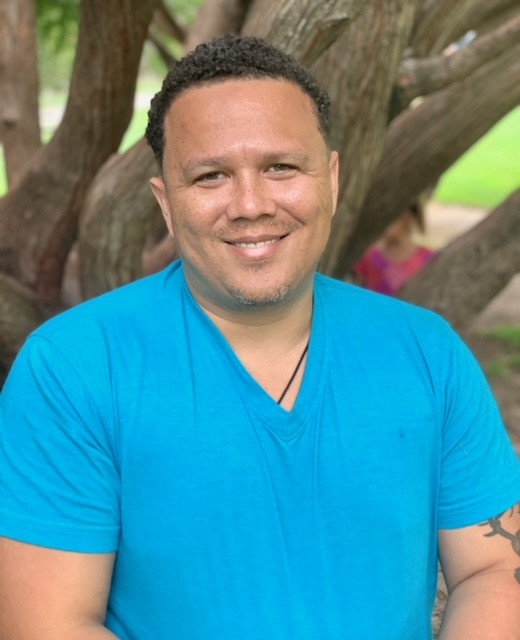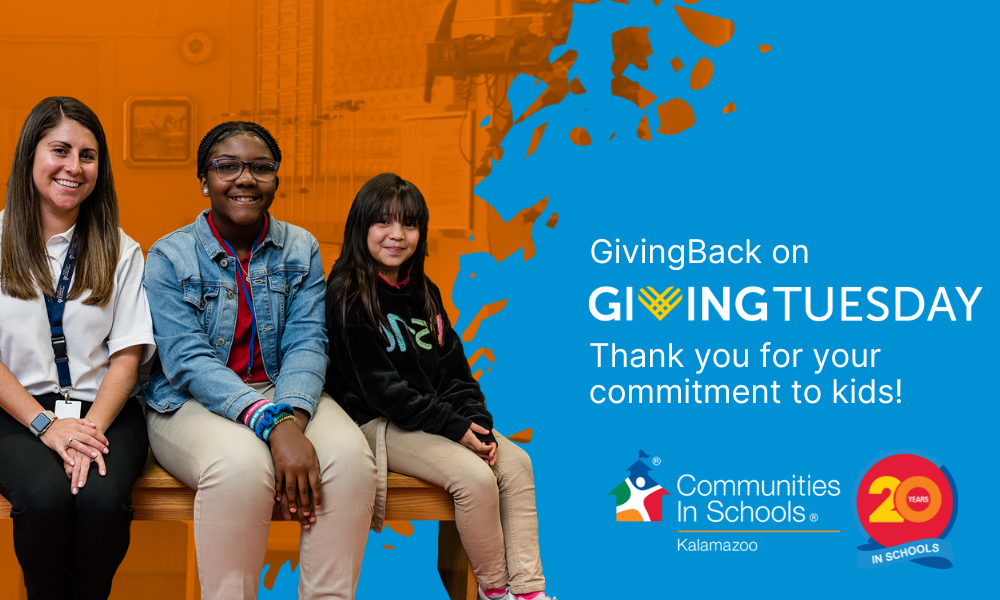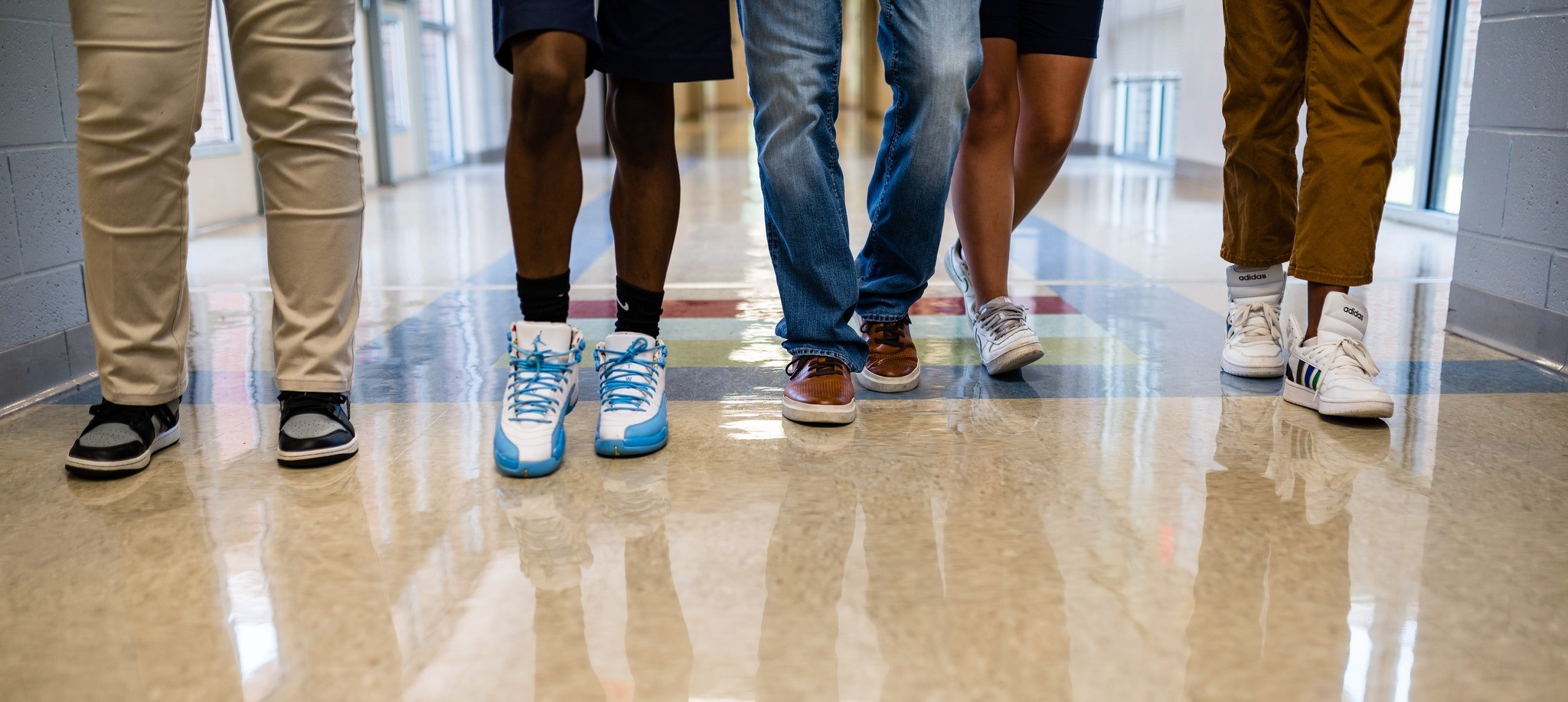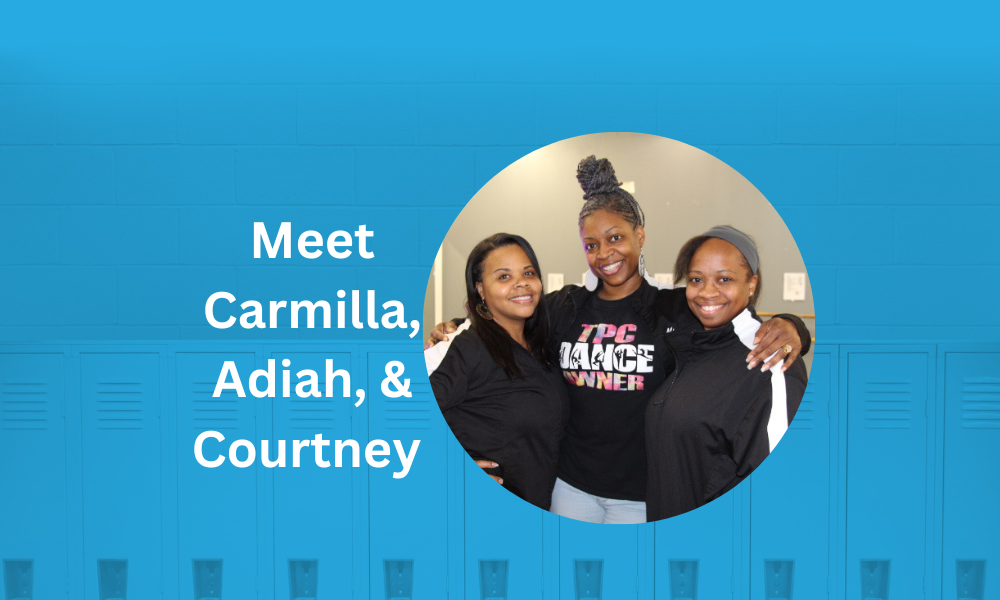Brandan Mitchell: Rooted and Growing in Kalamazoo

Welcome back to the POP QUIZ! This is a regular, yet totally unexpected, feature where we ask students, parents, staff, our friends, and partners to answer a few questions about what they are learning, reading, and thinking about. Today we feature one of our CIS partners, Brandan Mitchell, therapist and co-founder of Ubuntu Therapy: Healing through Community Inclusion. When a student is in need of mental health support, we are grateful that we can turn to Brandan.
While not originally from Kalamazoo, Brandan, who obtained his Master of Social Work from Western Michigan University, feels like he has always had roots in Kalamazoo. He grew up on his family-owned blueberry farm in Bangor, Michigan. “Kalamazoo was like my second home. It was like a vacation destination,” he says, as he was often visiting aunts and uncles who lived in the city. Now a father of four, (three of his children attend Kalamazoo Public Schools), Brandan and his wife Rebecca, who works as a nurse at Bronson Hospital, are firmly planted in Kalamazoo.
Alright, Brandan: pencil out, eyes on your own paper. Good luck.
Pop Quiz
Growing up on a blueberry farm, did you eat a lot of blueberries?
Oh my gosh yes! I started working on the farm around nine or ten years of age. As kids, we started off by making some money picking a bucket of berries, and as we got older, we got to work in the shed. And then we got to manage the field as we became teenagers …eating them while working, having them in blueberry muffins, blueberry pancakes, and blueberry cobblers. The elders in our family made the cobblers around Thanksgiving and they were always a big hit. I don’t eat too much of them now, however my wife and kids eat them all the time!
Does ubuntu have a specific meaning?
Yes. In the continent of Africa, ubuntu is a lifestyle. It means, I am because you are. And when talking about it in therapy, I emphasize this shared humanity that we all have. Often what I will say to my clients is “I hope to leave you with information to help you with your mental health. I also believe I’m abetter therapist by everyone who walks through my door.” They teach me about myself, as a father, a clinician, and they help me grow. I am because we are.
How did you first get interested in the ubuntu approach to therapy?
It was the interconnectedness that we all share that really spoke to my wife and I back in 2007 when Archbishop Desmond Tutu came to Miller Auditorium. My wife was six months pregnant at the time and our baby was quite active all while Desmond Tutu was speaking. We couldn’t decide on a name for our son so we picked Desmond!
…A professed “history nut,” I have long studied apartheid and fell upon the Truth and Reconciliation Commission (TRC) established to help deal with what happened under apartheid. And I became interested in the Fetzer Institute‘s Campaign for Love & Forgiveness and my interest evolved from there.It all really resonated with me. That we can see each other for the humanity we share.
Ubuntu therapy believes in healing through community inclusion. When we think about mental health, we often forget that the best antidote is to become active and engaged in your community. So seeing that shared humanity as we work through mental health issues, whether it be dealing with—depression, anxiety, anger, or whatever the case may be—going out and being active and being immersed in your community can lead to a healthier mindset. That’s the essence of ubuntu therapy, healing through community inclusion.
Throughout your career as a therapist, you probably have seen young people show resiliency in the face of hardships they deal with in their lives. The pandemic obviously adds a layer of stressors that wasn’t there before. How, in general, are the young people you see doing?
Every day we’re seeing kids and adults—everyone—being resilient and trying to adapt to the pandemic and the general state of affairs we’re in as a nation. There is no quick and easy answer. … In social media, there were these little fires brewing within friend groups, and conflicts were rising because we weren’t able to communicate like we were used to, in person and face to face.
…There was a phrase that I often found myself uttering in sessions when someone would tell me about the conflicts that they were having with someone in their circle. I’d ask them, “Have you talked to them about that yet?” And they would tell me no, they hadn’t.
You’ve got to connect with those people and let them know how you are feeling. We can’t set boundaries with people if we’re not communicating. And that is huge, right? To be able to set boundaries. Even between siblings, to be able to say, “Hey, knock it off. if you want to spend time with me and come into my room, let’s be in harmony with each other versus coming in and being antagonistic.”
We know that most common factor amongst children who have developed resilience is that they have at least one stable and committed relationship with a supportive and caring adult. What are some other factors you see in your practice that contribute to building resilience in young people?
There are tons of factors, but one of them is having a growth mindset, rather than a fixed mindset. When someone has adopted a fixed mindset, it’s easy to generate tons of excuses as to why we can’t do something. That fixed mindset helps us avoid experiencing uncomfortable feelings. While in the short term this approach may relieve some of the stress, we develop a maladaptive way of dealing with our issues and those effects become long-term.
A fixed mindset says, “I don’t’ have anything to wear today, so I will skip school.” An individual with a growth mindset would say, “I don’t have clothes to wear. Let me do some laundry.” A growth mindset looks at adversity from the perspective of optimism rather than pessimism. Having a growth mindset can help lift us during hard times.
What do you see as the value of CIS in the work you do as a therapist?
I’ve had the opportunity to work with various CIS staff like Nazhly Heredia-Waltemyer, Brenden Groggel, and Jenn Miner. All of us working together to accomplish the same goal.
CIS is that bridge, that multi-disciplinary team where if a student I’m working with falls off, when I need support of any kind, I can reach out to their CIS Site Coordinator or CIS Success Coach and they hit the ground running for me. They connect with the student and say, “Hey, Brandan’s been trying to get a hold of you.” They can help figure out what’s the barrier to therapy. They have established rapport with the kids and families and that makes a difference.
For example, during the early stages of the pandemic, with students doing virtual learning, it would have been difficult reaching the kids without CIS. If I wasn’t able to get a hold of a student, the site coordinator would go out to the home and let them know I’m trying to get a hold of them. Or they would get that paperwork signed, obtain the signatures needed to start therapy. The site coordinators have been great about getting all that stuff done. It’s a great partnership with CIS!
What are you currently reading?
I love chess so I like to read books on that subject matter. Sasha Chapin wrote a book about chess that I’m reading, Play Winning Chess by Yasser Seirawan and Get Out of Your Mind and Into Your Life by Steven C. Hayes
Where does your passion for chess come from?
I’ve always been a board gamer. I grew up playing monopoly and chess.
Right now I have an amazing chess tutor, Clara McGrew. She once played blindfolded and won! I’ll play on Chess.com with friends, family, or online. I’ve always have a few games going.
I also have a chess board in my office. I use it to help engage with clients on various levels. When appropriate I try to relate it to real life…advancing a piece up the board, holding a piece or when to make a sacrificing move…. There is so much about chess that is similar to life.
What is your favorite word or phrase right now?
I love quotes. Here’s one I like about not giving up: You miss 100 percent of the shots you don’t take. Life is about putting yourself out there and taking chances … So for kids with social anxiety, the best thing to do is to get out there! The very act of doing something can build confidence. You learn you can be in these different arenas in life, that you can be there and get something out of it. Often my clients will feel a sense of relief realizing that they can engage in the activity without having to be front and center.
Oh, and when it comes to favorite phrases, I have another phrase. I practice mindfulness and find it helps keep me balanced. So the other phrase, I’d say, is this: Create balance between mind, body, and soul.
Behind every successful person is a caring adult. Who is one of your caring adults?
Oh, man, so many! In ubuntu, we talk about how I’m not in this position because I got here alone. You know that old saying grab yourself by the bootstraps and do better. Ubuntu philosophy doesn’t buy into that …
My wife Rebecca is definitely one of those caring individuals. Through the thick of it, she’s been with me as we build our marriage, raise our kids, and all that comes with that. A motivator and influencer, she’s taught me about commitment. She’s my rock. She is the one who encouraged me to go out and start this business.
I’d also have to say my four kids. Each has a very different personality and they’ve all made me a better person. I’m more patient and a better therapist because of each of them.
And then there are all those other people who come into your life, like my former supervisor Bobby Casey. We worked together for five years in the children’s unit at Community Mental Health. And Felix Brooks, a mentor of mine, and I could go on …
Thank you, Brandan, for hanging out with us at Ask Me About My 12,000 Kids.
Tags: Brandan Mitchell, Brenden Groggel, CIS parntership, Communities In Schools of Kalamazoo (CIS), Jenn Miner, Nazhly Heredia-Waltemyer, Ubuntu Therapy: Healing through Community Inclusion




